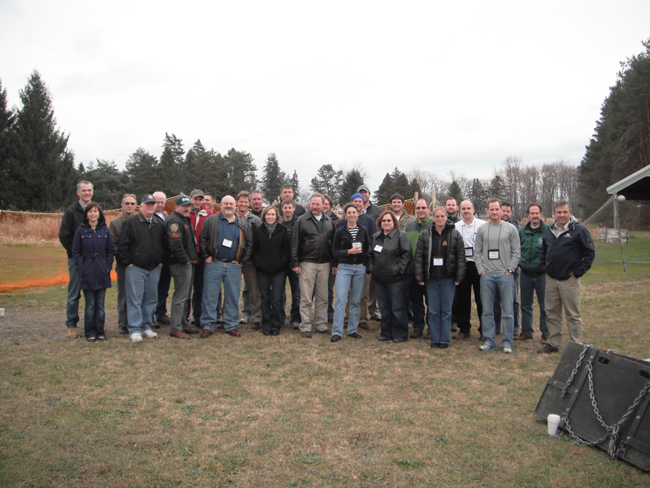Contacts:
David B. MacNeill, NYSG, E:
dbm4@cornell.edu, P: 315-312-3042
Brian F. Lantry, USGS, P: 315-343-3951
Oswego, NY, February 6, 2012 - The US Geological Survey (USGS) has just awarded New York Sea Grant (NYSG) and Fisheries Specialist
David B. MacNeill a "USGS Great Lakes Science Center Certificate of Appreciation" for a November 2011 trawling workshop. The November workshop, co-organized by MacNeill and USGS Research Fishery Biologist
Dr. Maureen Walsh, attracted 35 American and Canadian researchers and research vessel personnel representing all five Great Lakes.
Collecting fish samples with large underwater nets (trawls) provides
essential information for understanding food webs and managing fisheries
resources, which is why there was such a focus on bringing acclaimed expertise in marine trawl design to this Central New York workshop. The three-day intensive event was held at the Cornell University
Biological Field Station on Oneida Lake, a 439-acre property that serves
as a unit of the Department of Natural Resources for research in
fisheries and aquatic ecology in New York state.
USGS Lake Ontario Biological Station Director
Dr. Brian F. Lantry said, “This workshop was the best and most useful I have ever attended. The numerous emails USGS has received attest to participants feeling the same. This type of work makes a realistic, practical contribution to science.”
"MacNeill's partnership with Dr. Walsh and the staffs of the USGS Lake Ontario Biological Station and the Cornell Biological Field Station was instrumental in bringing about a workshop that was the first of its kind in the Great Lakes and heralded by all that attended as a rousing success," continued Lantry.
New York Sea Grant leadership in developing trawling design initiatives is creating positive impact across the Great Lakes and internationally. This trawling research vessel was built in the Czech Republic using trawl design training developed by NY Sea Grant. Photo: FishEcU, Czech Academy of Sciences.
The workshop included numerous hands-on trawl exhibits and classroom
time on design configurations, hydrodynamics, fish behavior impact on
catch efficiency, environmental variability, and new opportunities for
evaluating trawl designs for use in the Great Lakes.
An unprecedented opportunity presented itself at the workshop for a marine-Great Lakes exchange between
Dr. Paul Winger and his internationally-respected fishing gear and marine trawl evaluation team of
George Legge,
Philip Walsh and
Tara Perry from the Memorial University of Newfoundland’s (MUN) Centre for Sustainable Aquatic Resources. MUN has the world's largest flume tank, which simulates real-world conditions. A week's worth of testing trawl models there can save months of work on the water with full-size nets.
“We were pleased to share what we know about fishing gear design and how to increase both trawl and fuel efficiencies, reduce ecological impacts, and obtain the quality of data needed for fisheries science and development,” Dr. Winger said.
Workshop participant
Gary Czypinski, US Fish & Wildlife Service in Ashland, Wisconsin, said, “Trawling is a very good tool for early detection of new invasive species. I came hoping to gain an edge for catching Asian carp which are very successful in evading a bottom trawl.”
Spring-fall trawls have been cooperatively conducted by U.S. federal and state and Canadian provincial agencies on Lake Ontario since the 1970s.
New York State Department of Environmental Conservation (NYSDEC) Research Biologist
Mike Connerton of the NYSDEC Seth Green fisheries research vessel at Cape Vincent, NY, said, “The mussels in Lake Ontario have forced us to change the gear we use. Understanding net performance and the latest technology for evaluating our gears will help us obtain the best data possible.”
 The November 2011 trawling workshop attracted 35 American and Canadian researchers and
research vessel personnel representing all five Great Lakes.
The November 2011 trawling workshop attracted 35 American and Canadian researchers and
research vessel personnel representing all five Great Lakes.
New York Sea Grant Director
Jim Ammerman noted, “This important workshop is a product of the National Sea Grant office support for the Lake Ontario team of the Great Lakes Regional Research Network.”
New York Sea Grant Associate Director
Dr. Kathy Bunting-Howarth commented, “This workshop is a fine example of what Extension is all about - transferring knowledge and empowering people to use science to its best result.”
"Dave MacNeill's continued focus on bringing his expertise and Sea Grant backing and funding issues both important and relevant to Great Lakes fisheries management, research and restoration has again proving its' value," says Lantry. "As colleagues and trawl practitioners, we thank Dave and look forward to continued collaboration."
A Great Lakes Regional Research Network grant to NYSG funded the trawl design workshop. Last month,
Michigan Sea Grant hosted a follow-up workshop on “Factors Affecting Trawl Catchability” at the Lake Superior Technical Committee meeting in Duluth, Minnesota. At this meeting, MUN's Dr. Winger presented his own research factors influencing trawl catchability. For more information, see the related news item from Michigan State University's Extension (
pdf).
New York Sea Grant is a statewide network of integrated research, education, and extension services promoting the coastal economic vitality, environmental sustainability and citizen awareness about the State's marine and Great Lakes resources. One of 32 university-based programs under the NOAA’s National Sea Grant College Program, NYSG is a cooperative program of the State University of New York and Cornell University.